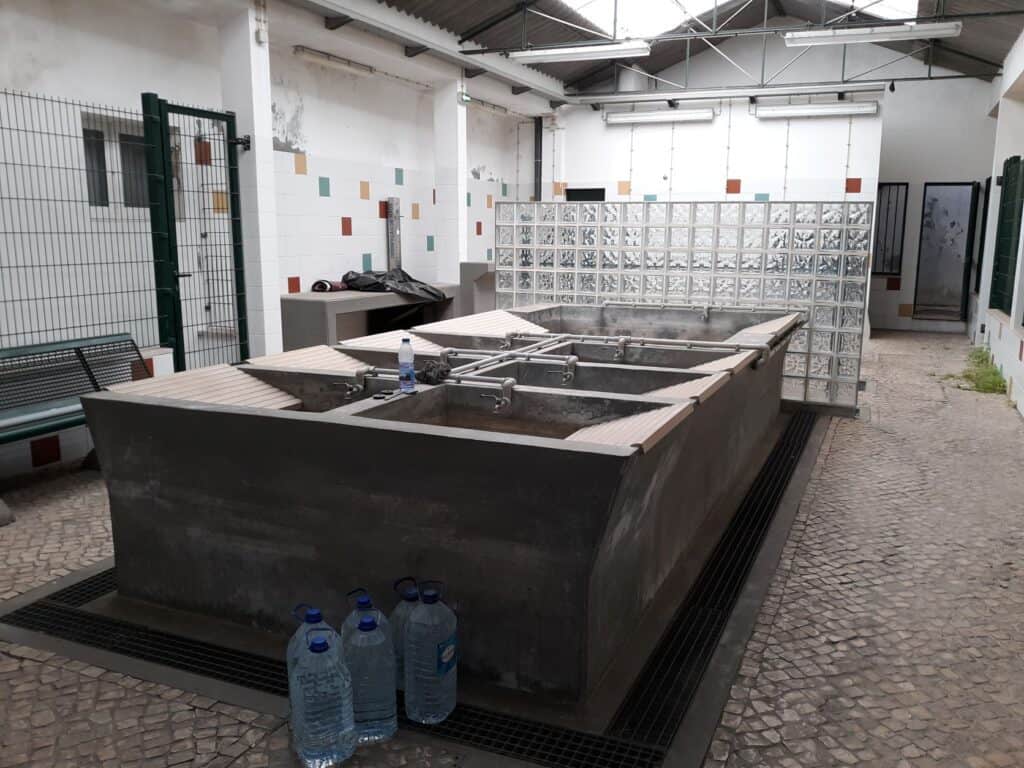Lavadouros have traditionally been places where ladies (it’s almost always women) come to wash clothes, chat with neighbors, and sing.
These days, most modern Portuguese houses are outfitted with washing machines (if not clothes dryers). Those that don’t have a washer will pop down to the Lavandaria (laundromat).
However, even if they are infrequently used, many traditional wash houses still stand, complete with concrete wash basins and a ridged scrubbing deck.
Where to see a Lavadouro
Lisbon
Over time, the Lavadouros in Portugal fell into disuse, crumbled, and were torn down to make way for modern buildings. So, it is rare to find a Lavadouro in a big city like Lisbon.
Despite this, there is, right there in the Alfama neighborhood, a classic wash house. It’s usually locked up tight, but apparently there’s a local women who occasionally comes by to do her wash, charging tourists a small fee to take her picture. Even if she’s not there, fresh jugs of water are clearly visible in the Alfama Lavadouro, signifying it’s still in use. And, it’s clean and well-maintained, so someone is looking after Lavadouro Publico.

Alfama is one of the most charming and traditional neighborhoods in Lisbon and worth spending a good bit of time in. If you do drop by the Lavandouro Publico, don’t expect to be allowed inside. As I said, it’s usually locked up. But, you can easily see inside and snap a picture. There’s also a square nearby where ladies sell Ginjinha and the Lavandouro is a few steps from one of my favorite Lisbon restaurants, Roda Viva. They serve Mozambique cuisine and it’s terrific!
Azeitão
Azeitão is a small town south of in the Setubal district. It’s less than an hour by bus from Lisbon. Azeitão is known for its excellent wine production and its eponymous soft creamy cheese.

Sabores e Encantos de Azeitãos is a cafe on the main drag that used to be the local Lavadouro. The wash basins have been converted into a large fountain, ringed by tables. Guests will often toss coins into the former washing station, making a wish as they do so.
Other Lavadouros in Portugal
Like other countries in Europe, many of the rural towns in Portugal have suffered severe population declines as people have moved to the city looking for better economic opportunities.
Since no one is constructing new houses or commercial buildings in these villages, the old Lavadouros remain standing. Some are still in use. Others stand vacant, a relic to a time when washing clothes was a communal activity.
The folks are Waymarking have done a good job crowdsourcing photos and the locations of these structures. This link has dozens of Lavadouros throughout Portugal as well as lots and lots in France and Spain. While many of them are off the beaten path, a visit might prove quite enjoyable. And, who knows, maybe you can clean your sweaty socks while you’re at it.
About the Author

Brent Petersen is the Editor-in-Chief of Destination Eat Drink. He currently resides in Setubal, Portugal. Brent has written the novel “Truffle Hunt” (Eckhartz Press) and the short story collection “That Bird.” He’s also written dozens of foodie travel guides to cities around the world on Destination Eat Drink, including in-depth eating and drinking guides to Lisbon, Porto, Sintra, Monsaraz, and Evora in Portugal. Brent’s podcast, also called Destination Eat Drink, is available on all major podcasting platforms and is distributed by the Radio Misfits Podcast Network.
